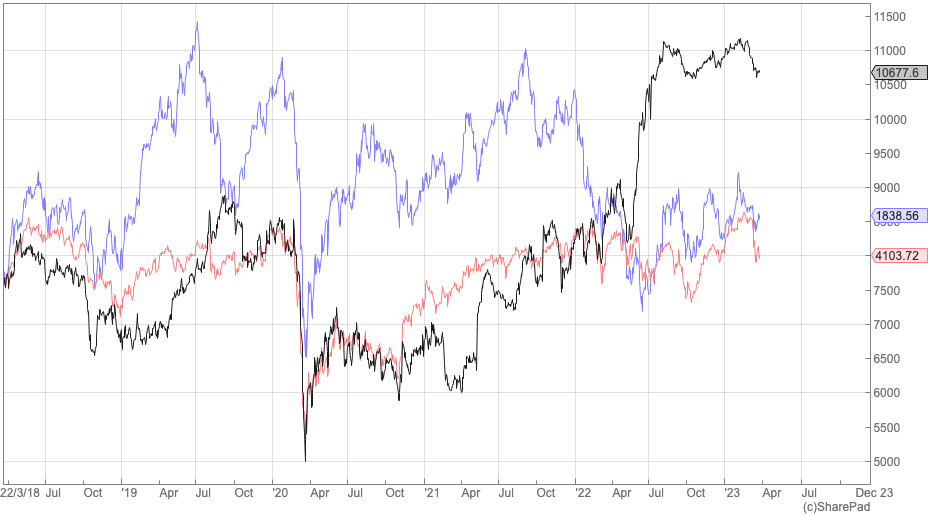Technology and healthcare shares experienced very mixed returns last year. But is it time for investors to change their expectations for these sectors? Ben Hobson explores what might lie ahead.

Twelve months of turmoil made 2022 a year to forget for many investors. But one trend that deserves to live long in the memory is how different industry sectors performed in the face of economic pressure. Two of the most notable were technology and healthcare.
On paper, the nature of these two sectors means that they tend to perform differently from each other. When one zigs the other zags. And that’s exactly what happened in the tricky conditions last year.
But while their differing fortunes are a reminder of why broad sector diversification is often recommended, there is a twist in this tale. New research suggests that both sectors are actually evolving in ways that could change the way they’re expected to perform in the future.
Before I start trying to make sense of that, let’s rewind and take a look at what happened with technology and healthcare last year.
A tale of two sectors
While technology isn’t exactly a cyclical industry, it is sensitive to the economy. With high inflation, rising interest rates and worries about a possible recession, some tech companies have suffered badly. Many that grew quickly during the Covid pandemic have faced a stinging contraction.
Nowhere was this more apparent than among the mega-cap tech giants in the United States. So-called FAANG shares cratered, with even the biggest firms like Microsoft, Alphabet and Meta hastily redrawing business plans and trying to assuage rattled investors.
Healthcare enjoyed a very different experience. As a classic defensive industry (if you omit the speculative small-cap biotechs), healthcare and its low sensitivity to the economy, dependable earnings and attractive dividends became a popular safe haven.
Just take a look at this chart of the FTSE 350 Healthcare index (black line) versus the FTSE 350 Technology index (purple line) and the FTSE 350 itself (pink line) in recent years.

Chart: SharePad
You can see that the technology index performed well but was prone to wild swings in the upbeat years prior to 2022. The healthcare index was much more modest, following a path closer to the index. But when the narrative changed last year, healthcare roared ahead while technology fell flat.
This switch in performance gets to the heart of why investors are often urged to diversify their sector exposure. Making sure you are not over-reliant on specific industries or parts of the economy is one way of smoothing out unpredictable setbacks over time.
Here is a simple framework for understanding the economic sensitivity of different industries:
- Cyclicals: Basic Materials, Consumer Cyclicals, Financials
- Sensitives: Industrials, Energy, Telecoms, Technology
- Defensives: Healthcare, Consumer Defensives, Utilities
The catch, of course, is that these broad industry sectors comprise a wide range of different business areas. And some are more sensitive to the economy than others.
That’s why new research from the asset manager AllianceBernstein caught my eye. It points out that when you strip away the difficulties of the headline-grabbing tech giants, the technology sector is actually home to many firms that are sturdier and more predictable than you might think. Whisper it, but it’s an area that has some defensive qualities about it.
Crucially, it’s not the bubbly consumer-facing social media, apps and services where you’ll find them. Rather, it’s in companies that make computer hardware, process payments, operate cloud computing and make chips. The researchers reckon focusing on low beta (relatively low price sensitivity to the market) is one place to start looking.
With that in mind, here’s a view of some of the strongest performing UK tech names over the past year – that are also low Beta.
I found that most shares in the sector have Betas lower than 1, so it seems like it isn’t perhaps as volatile as it is in the US (where tech is much larger and more influential on the market). It’s a signal that this is perhaps a less risky sector than you might think.
This table shows shares that have outperformed the FTSE All Share on a 12 and three-month basis, sorted by the proximity to their 52-week highs. After a very strong month price-wise, both Altitude Group and Spectra Systems lead on that basis.
Top 5 Technology Sector Performers
|
Name |
Market Cap £m |
Chg since 1y high % |
Rel to FTSE All Share (1y) % |
Beta 5y daily |
City holdings 3m change % |
Dir holdings 3m change % |
|
Altitude Group |
29 |
0 |
52 |
0.78 |
-0.741 |
0 |
|
Spectra Systems |
83.1 |
0 |
25.2 |
0.5 |
0 |
0 |
|
Moneysupermarket |
1,325.00 |
-0.202 |
27.7 |
0.77 |
-0.0002 |
0.0096 |
|
Quixant |
126.3 |
-3.38 |
41.4 |
0.33 |
9.1929 |
-0.4669 |
|
Zoo Digital |
178.5 |
-3.61 |
69.1 |
0.79 |
-0.4409 |
0 |
There are some excellent data points available in the SharePad library, and I’ve included a couple of current favourites: changes in both director holdings and major shareholders over the past three months. This offers a clue to whether insiders have been buying or selling into the price strength of these shares. On the technology side, Quixant has seen the biggest trading, with a 9% increase in institutional holdings.
AllianceBernstein’s research also suggests there could be more to the healthcare sector than just a defensive play. Technological innovation is starting to make it much more appealing to growth investors. It has always had a speculative edge to it, but the study points to emerging technologies and the shift towards personalised treatments and surgical advancements as reasons to look twice.
That said, they reckon that a focus on high Return on Capital Employed (ROCE) remains essential in pinning down the most profitable and least speculative healthcare stocks.
Using SharePad’s industry ranking, this table is sorted based on the strongest ROCEs in the sector. On this basis, it’s interesting to note that most are currently way below their 52-week highs, which might suggest that investor sentiment has eased back from the sector in 2023.
|
Name |
Market Cap £m |
ROCE |
ROCE rank in Industry |
Chg since 1y high % |
City holdings 3m change % |
Dir holdings 3m change % |
|
Bioventix |
209.7 |
78.1 |
2 out of 122 |
-5.74 |
-0.2384 |
-1.1055 |
|
Cambridge Cognition |
36.7 |
65.6 |
3 out of 122 |
-42.2 |
2.8077 |
0.015 |
|
Integrated Diagnostic |
227.1 |
64.7 |
4 out of 122 |
-61.7 |
0 |
0 |
|
Ergomed |
518.1 |
24.7 |
8 out of 122 |
-29.1 |
1.6392 |
-0.0498 |
|
EKF Diagnostics |
119 |
23.6 |
9 out of 122 |
-49.1 |
0.014 |
0 |
A long-time ROCE winner in healthcare is Bioventix. After a multi-year run, its shares pulled back through 2022, but they have been much more solid in recent months. In terms of insider trades, there has been some modest City buying at Cambridge Cognition and Ergomed.
Ben Hobson
Got some thoughts on this week’s article from Ben? Share these in the SharePad chat. Login to SharePad – click on the chat icon in the top right – select or search for ‘share chat’.
This article is for educational purposes only. It is not a recommendation to buy or sell shares or other investments. Do your own research before buying or selling any investment or seek professional financial advice.



